SsangYong Korando VS Toyota Highlander – Specs, Efficiency & Price Comparison
Which model is the better choice – the SsangYong Korando or the Toyota Highlander? We compare performance (190 HP vs ), boot capacity (551 L vs ), efficiency (16.80 kWh7.50 L vs ), and of course, the price (27000 £ vs ).
Find out now which car fits your needs better!
The SsangYong Korando (SUV) is powered by a Petrol or Electric engine and comes with a Manuel or Automatic transmission. In comparison, the Toyota Highlander () features a engine and a gearbox.
When it comes to boot capacity, the SsangYong Korando offers 551 L, while the Toyota Highlander provides – depending on what matters most to you. If you’re looking for more power, you’ll need to decide whether the 190 HP of the SsangYong Korando or the of the Toyota Highlander suits your needs better.
There are also differences in efficiency: 16.80 kWh7.50 L vs . In terms of price, the SsangYong Korando starts at 27000 £, while the Toyota Highlander is available from .
Compare all the key specs now and find out which model fits your lifestyle best!
SsangYong Korando
The SsangYong Korando offers a blend of contemporary design and practicality, making it an appealing choice for urban adventurers. Its spacious interior and comfortable seating ensure a pleasant driving experience for both driver and passengers. With its reliable performance and advanced features, the Korando stands out in the competitive SUV market.
details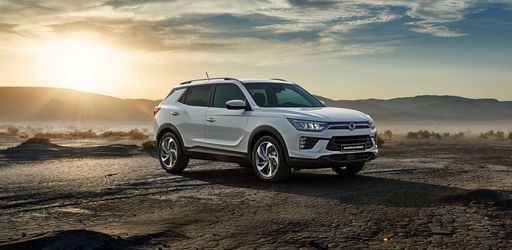 @ Ssangyong
@ Ssangyong
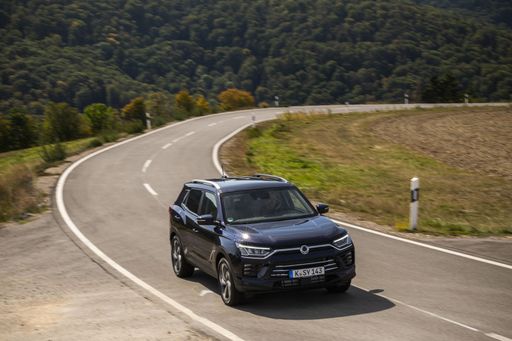 @ Ssangyong
@ Ssangyong
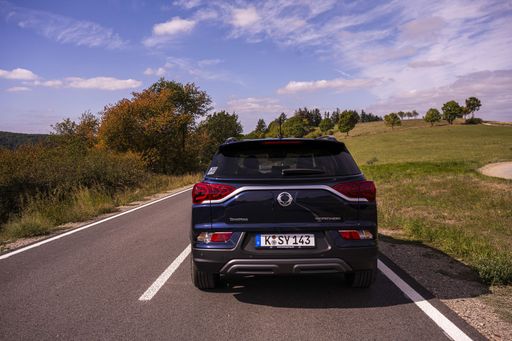 @ Ssangyong
@ Ssangyong
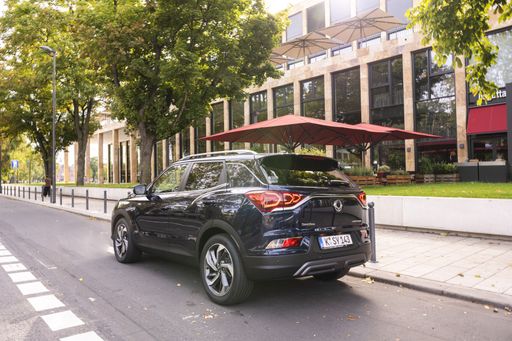 @ Ssangyong
@ Ssangyong
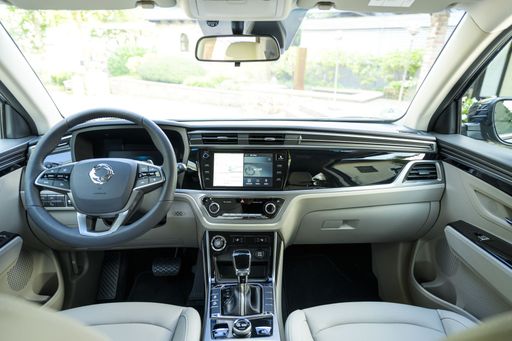 @ Ssangyong
@ Ssangyong
Toyota Highlander
The Toyota Highlander is a versatile SUV that seamlessly blends comfort and practicality, making it an ideal choice for families and adventurers alike. With its spacious interior and a clever layout, it offers ample room for passengers and luggage, ensuring every journey is a comfortable experience. Its sophisticated design is complemented by advanced technology features, enhancing both connectivity and safety on the road.
details @ Toyota
@ Toyota
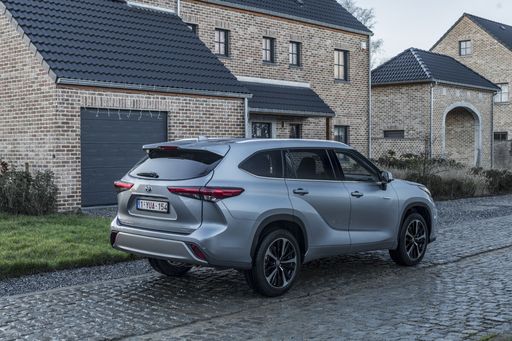 @ Toyota
@ Toyota
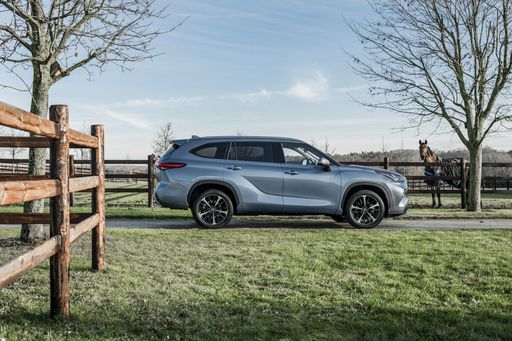 @ Toyota
@ Toyota
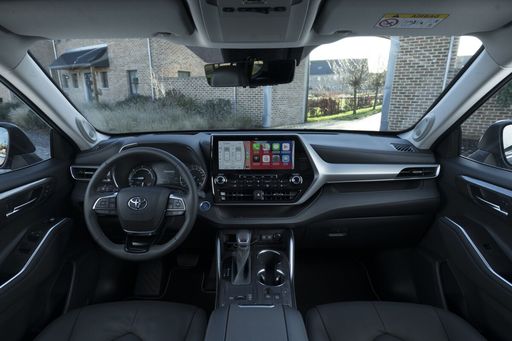 @ Toyota
@ Toyota
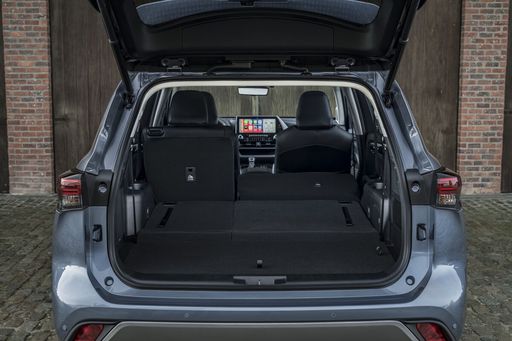 @ Toyota
@ Toyota

|

|
|
|
|
Costs and Consumption |
|
|---|---|
|
Price
27000 - 42000 £
|
Price
-
|
|
Consumption L/100km
7.5 - 8.6 L
|
Consumption L/100km
-
|
|
Consumption kWh/100km
16.80 kWh
|
Consumption kWh/100km
-
|
|
Electric Range
339 km
|
Electric Range
-
|
|
Battery Capacity
-
|
Battery Capacity
-
|
|
co2
0 - 197 g/km
|
co2
-
|
|
Fuel tank capacity
50 L
|
Fuel tank capacity
-
|
Dimensions and Body |
|
|---|---|
|
Body Type
SUV
|
Body Type
-
|
|
Seats
5
|
Seats
-
|
|
Doors
5
|
Doors
-
|
|
Curb weight
1517 - 1840 kg
|
Curb weight
-
|
|
Trunk capacity
551 L
|
Trunk capacity
-
|
|
Length
4450 - 4465 mm
|
Length
-
|
|
Width
1870 mm
|
Width
-
|
|
Height
1620 - 1645 mm
|
Height
-
|
|
Payload
410 - 463 kg
|
Payload
-
|
Engine and Performance |
|
|---|---|
|
Engine Type
Petrol, Electric
|
Engine Type
-
|
|
Transmission
Manuel, Automatic
|
Transmission
-
|
|
Transmission Detail
Manual Gearbox, Automatic Gearbox, Reduction Gearbox
|
Transmission Detail
-
|
|
Drive Type
Front-Wheel Drive, All-Wheel Drive
|
Drive Type
-
|
|
Power HP
163 - 190 HP
|
Power HP
-
|
|
Acceleration 0-100km/h
8.40 s
|
Acceleration 0-100km/h
-
|
|
Max Speed
156 - 191 km/h
|
Max Speed
-
|
|
Torque
260 - 360 Nm
|
Torque
-
|
|
Number of Cylinders
4
|
Number of Cylinders
-
|
|
Power kW
120 - 140 kW
|
Power kW
-
|
|
Engine capacity
1497 cm3
|
Engine capacity
-
|
General |
|
|---|---|
|
Model Year
2021 - 2023
|
Model Year
-
|
|
CO2 Efficiency Class
F, G, A
|
CO2 Efficiency Class
-
|
|
Brand
SsangYong
|
Brand
-
|
SsangYong Korando
Discovering the SsangYong Korando: Combining Performance with Innovation
The SsangYong Korando has persistently evolved, emerging as a formidable presence in the compact SUV segment. With a blend of intriguing design, versatile engine options, and cutting-edge technology, the Korando aims to cater to a diverse array of driving preferences and needs. In this article, we delve into the technical intricacies and pioneering innovations that define the vehicle.
A Versatile Engine Line-up: Catering to Petrol and Electric Enthusiasts
The Korando provides a remarkable variety of powertrains, accommodating drivers who favour both traditional petrol engines and modern electric motors. For petrol enthusiasts, the Korando comes equipped with a 1.5 GDI-T engine, boasting a power output of 163 PS. Available in both manual and automatic transmission, and offering either front-wheel or all-wheel drive, these variants promise a dynamically engaging driving experience.
The brand’s commitment to sustainability is evident with the introduction of the E-Motion model, which is powered by an electric motor delivering 190 PS. With a commendable range of 339 km and an energy consumption of 16.8 kWh/100km, the E-Motion exemplifies SsangYong's ambition to shape the future of eco-friendly motoring.
Technical Excellence: Performance and Efficiency
With a peak speed ranging between 156 to 191 km/h, the Korando ensures that drivers experience both agility and responsiveness. The petrol variants offer a respectable efficiency, with fuel consumption spanning from 7.5 to 8.6 L/100km, while the electric variant promotes zero emissions. This makes the Korando an optimal choice for those conscious of both performance and environmental impact.
Acceleration from 0 to 100 km/h in just 8.4 seconds—paired with a torque range of 260 to 360 Nm—ensures an exhilarating ride whether navigating city streets or venturing onto open highways. Moreover, with a robust towing capacity, the Korando stands as a reliable companion for any adventure.
Interior Quality and Innovative Features
Inside the Korando, occupants are greeted by a spacious cabin designed with emphasis on comfort and practicality. Advanced infotainment systems seamlessly integrate with connectivity features, ensuring that every journey is both entertaining and stress-free. Emphasising safety, the Korando is equipped with multiple driver-assistance systems, including adaptive cruise control and lane-keeping assist.
Mirroring its exterior aesthetics, the interior is crafted with premium materials, providing a serene ambience throughout the ride. With abundant luggage space, a family of five can effortlessly embark on long-distance travels without compromises on space or comfort.
Conclusion: A Synergy of Tradition and Modernity
The SsangYong Korando seamlessly merges robust performance with cutting-edge innovation, appealing to a wide demographic of drivers. Whether drawn to the unmistakable power of its petrol engines or the sustainable allure of its electric variant, prospective owners are sure to find a model that complements their lifestyle. The Korando remains an impactful player in the SUV landscape, continually adapting to the demands of modern-day motoring while staying true to its heritage.
Toyota Highlander
Meet the Toyota Highlander: A Synergy of Power and Efficiency
The Toyota Highlander stands as a testament to modern automotive engineering, blending robust design with state-of-the-art hybrid technology. Designed for families seeking both luxury and practicality, this SUV is more than just a means of transportation—it is an innovative solution to contemporary demands.
Stellar Performance and Hybrid Technology
Under the bonnet of the Highlander lies a full-hybrid powertrain that marries efficiency with performance. Producing an impressive 248 PS, the Highlander doesn't just promise power but delivers it with a refined acceleration from 0 to 100 km/h in just 8.3 seconds. Such performance is coupled with a frugal fuel consumption rate ranging between 6.6 and 7.1 L/100km, setting a benchmark for hybrid SUVs in its class.
A Dynamic Driving Experience
Fitted with a Continuously Variable Transmission (CVT), the Highlander ensures a smooth and responsive driving experience. The all-wheel-drive system enhances safety and control, providing confidence across various driving conditions. With a maximum speed of 180 km/h, this SUV is crafted to perform on both city streets and open highways.
Precision Engineering and Eco-Conscious Design
The Highlander boasts a four-cylinder engine with a displacement of 2487 cm³, perfectly balancing power and environmental considerations. Despite its robust performance, the vehicle remains eco-conscious, adhering to CO2 emissions ranging from 149 to 160 g/km, classified under the CO2 efficiency classes E and F.
Space and Luxury Redefined
Designed with practicality in mind, the Highlander seats seven comfortably, making it an ideal choice for family adventures. Its 241-litre boot capacity, expandable with rear seats folded, ensures storage space is never a concern. From its elegant body design measuring 4966 mm in length to its expansive width of 1930 mm, the Highlander exudes both strength and elegance.
Unmatched Safety and Features
Incorporated within the Highlander are safety features and innovative technologies that enhance every drive. Depending on the trim level—Business Edition, Executive, or Luxury—drivers are offered an array of amenities designed to improve comfort and security.
Cost-Effective Ownership
Though packed with features, the Highlander remains cost-effective. Monthly costs range from €1428 to €1606, with per kilometre expenses of 57.2 to 64.3 cents. This financial feasibility, combined with enduring quality, makes the Highlander a worthwhile investment for conscientious consumers.
Conclusion
The Toyota Highlander transcends the typical expectations of an SUV, providing an exceptional blend of power, space, and technology. Whether navigating urban landscapes or embarking on rural escapes, it promises to deliver with unparalleled versatility and comfort.
The prices and data displayed are estimates based on German list prices and may vary by country. This information is not legally binding.
